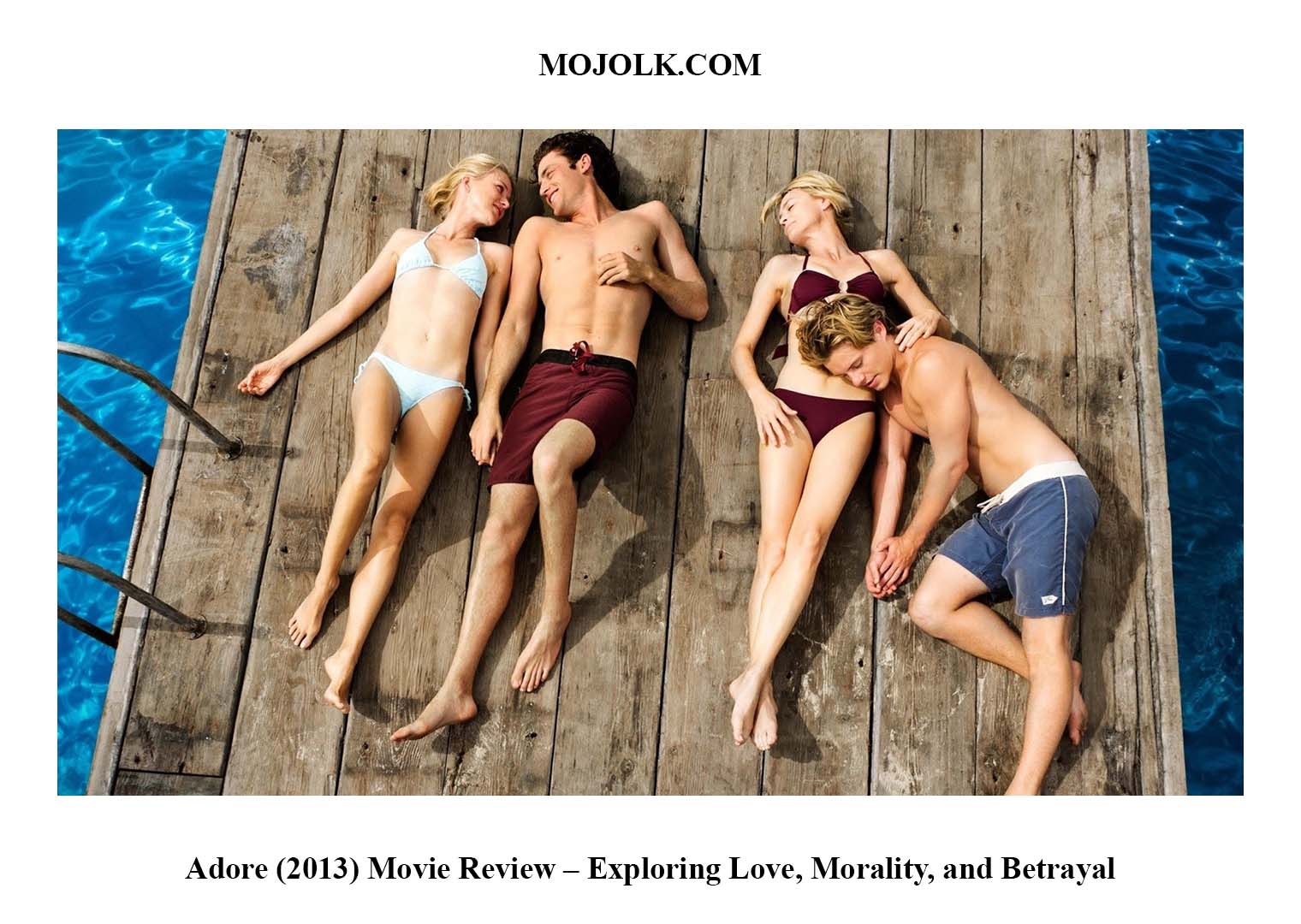Introduction – Why Adore (2013) Stands Out in Romantic Drama
Adore (2013) presents one of the most provocative and emotionally charged stories in modern cinema. Directed by Anne Fontaine, the film explores the complex emotional relationships between two lifelong friends and each other’s sons. The movie challenges societal norms and delves into the moral ambiguity surrounding unconventional love. Released in 2013, Adore sparked both praise and criticism for its daring subject matter and emotional depth.
Plot Summary – The Storyline Behind Adore (2013)
The story follows Roz (Robin Wright) and Lil (Naomi Watts), two childhood friends who have maintained a close bond into adulthood. Their sons, Ian (Xavier Samuel) and Tom (James Frecheville), also grow up as best friends. After Roz’s husband leaves, Ian develops romantic feelings for Roz, and Lil’s son Tom becomes drawn to Lil. The relationships that emerge between the two mothers and their sons create emotional turmoil and moral conflict. As the story unfolds, the characters face jealousy, betrayal, and the consequences of their unconventional relationships.
Direction – Anne Fontaine’s Bold and Subtle Approach
Anne Fontaine directs Adore (2013) with a delicate balance of sensitivity and boldness. She handles the film’s controversial themes with care, ensuring the story remains emotionally authentic. Fontaine focuses on subtle gestures and unspoken tension, allowing the characters’ emotions to drive the narrative. Her decision to shoot the film in the scenic coastal landscapes of Australia enhances the film’s emotional tone. The ocean serves as a metaphor for the characters’ emotional highs and lows.
Acting – Naomi Watts and Robin Wright Deliver Powerful Performances
Naomi Watts and Robin Wright anchor the film with emotionally charged performances. Watts portrays Lil with quiet strength and vulnerability, capturing the conflict between desire and morality. Wright delivers a nuanced performance as Roz, showing how emotional dependency and love can blur moral lines. Xavier Samuel and James Frecheville also shine as Ian and Tom. Samuel conveys Ian’s youthful intensity and emotional confusion with authenticity, while Frecheville gives Tom a sense of quiet longing and resentment. The chemistry among the four leads creates believable and emotionally charged relationships.
Themes and Symbolism – The Moral Complexity of Love and Betrayal
Adore (2013) explores themes of forbidden love, betrayal, and moral ambiguity. The relationships between the characters challenge conventional ideas of love and loyalty. The ocean, which appears throughout the film, symbolizes the emotional turmoil and unpredictability of their relationships. Fontaine uses quiet moments and natural surroundings to reflect the internal conflicts of the characters. The film does not offer clear moral judgments, leaving viewers to interpret the characters’ decisions.
Cinematography – Christophe Beaucarne’s Artistic Vision
Christophe Beaucarne’s cinematography elevates Adore (2013) with visually stunning imagery. He uses natural light and soft color palettes to create an intimate atmosphere. The camera work focuses on close-ups and body language, highlighting the tension and emotional complexity between the characters. The beach scenes, framed by open skies and rolling waves, contrast the emotional confinement felt by the characters.
Storyline – Why Adore (2013) Pushes Emotional Boundaries
The screenplay by Christopher Hampton, based on Doris Lessing’s novella The Grandmothers, crafts a story that blends emotional depth with psychological tension. The dialogue remains minimal, relying on the actors’ expressions and body language to convey emotions. The film does not rely on dramatic confrontations; instead, it builds tension through quiet moments and emotional shifts. The relationships evolve naturally, making the emotional stakes feel real and immediate.
True Story – Is Adore (2013) Based on Real Events?
While Adore (2013) is not based on a true story, it draws inspiration from Doris Lessing’s The Grandmothers, which explores similar themes of forbidden love and emotional dependency. Lessing’s work examines human relationships from a psychological and emotional perspective. Fontaine remains faithful to the core themes of the novella while adapting the story for a modern audience.
Controversy – Mixed Reactions from Critics and Audiences
Adore (2013) sparked controversy due to its portrayal of taboo relationships. Some critics praised the film’s emotional honesty and complex characters. Others criticized it for blurring moral boundaries and failing to provide clear moral guidance. Despite the polarizing reception, most viewers acknowledged the strength of the performances and the film’s artistic integrity.
Cultural Impact – How Adore (2013) Changed Romantic Drama
Adore (2013) remains one of the most daring romantic dramas of the past decade. It challenged traditional narratives of love and relationships, influencing other films that explore complex emotional themes. The film’s visual style and emotional depth have inspired similar works in both independent and mainstream cinema.
Conclusion – Why Adore (2013) Deserves Recognition
Adore (2013) stands out for its fearless exploration of unconventional love and emotional complexity. Fontaine’s direction, combined with Watts and Wright’s compelling performances, creates a powerful and thought-provoking film. The movie’s ability to balance beauty with emotional discomfort makes it a unique entry in the romantic drama genre. For viewers seeking a film that challenges traditional ideas of love and morality, Adore (2013) remains essential viewing.

